Matthew Yglesias's Blog, page 2317
May 11, 2011
Representative John Carter (R-TX) Sings The Praises Of Norwegian Fossil Fuel Socialism
The small Scandinavian country of Norway often has to get thrown out of international comparisons of various indicators because it's such an outlier. But another way of looking at it is just that Norway is a super-successful country, a nation that's been able to beat the "resource curse" and achieve unparalleled prosperity through a mix of collective ownership of the means of production and a generous welfare state. So it's certainly interesting that Representative John Carter of Texas—a Republican no less—is a big fan of the Norwegian social model:
The thing is we don't know — we all speculate to some extent — but I think it's [a] pretty easy commonsense position to take that the more supply we have with the demand — we are the demand capital of the world on burning gasoline and diesel. We outshine anyone else on the face of this globe in the use of those products. And we have relatively cheap prices as compared to other countries — especially countries that have no production. They can get very expensive very quickly. Until very recently, there was no oil or gas at all to amount to anything in what we now call Western Europe. Today there is. They have found it offshore, they have found it on the land in Holland and Norway and other places. Norway's one of the — something like the third biggest producer of offshore oil in the world now. They're doing extremely well and running their economy in a very frugal manner. Very smart people. And they should be commended. We should do so good.
Now as Matt Finklestein points out, it's a bit strange that Representative Carter completely forgot to mention the part where "the Norwegian oil industry is owned primarily by the state." Many progressives have been pushing for a change to the tax code to remove subsidies for oil and gas producers, which is a good idea, but to really do so good as the Norwegians what we need to do is nationalize the companies.
After all, it's worth noting that the United States actually produces much more oil than Norway:
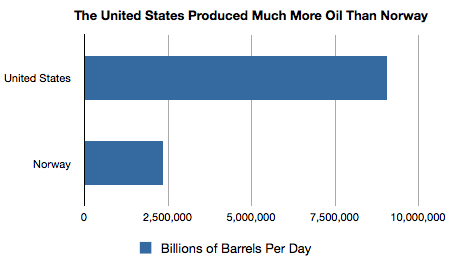
Of course full-scale socialism would cut against the grain of American political culture and may be a bad idea for other reasons. But surely we can agree that if the Norwegian model works well it makes sense to take a baby step or two in that direction by ensuring that these companies pay their fair share of taxes.


Pakistanis Don't Like Violent Radical Groups, But Support For Them Is Higher In The Middle Class
It seems natural to most people to suppose that support for violent radical organizations in countries like Pakistan must be linked to poor economic conditions, but evidence to back this up is hard to come by. Indeed, research from Graeme Blair, Chrstine Fair, Neil Malhotr, and Jacob N. Shapiro published as "Poverty and Support for Militant Politics: Evidence from Pakistan" (PDF) finds that it's actually the reverse:
To address this gap we conducted a 6000-person, nationally representative survey of Pakistanis that measures affect towards four important militant organizations. We apply a novel measurement strategy to mitigate item nonresponse, which plagued previous surveys due to the sensitive nature of militancy. Our study reveals three key patterns. First, Pakistanis exhibit negative affect toward all four militant organizations, with those from areas where groups have conducted the most attacks disliking them the most. Second, contrary to conventional expectations poor Pakistanis dislike militant groups more than middle-class citizens. Third, this dislike is strongest among poor urban residents, suggesting that the negative relationship stems from exposure to the externalities of terrorist attacks. Longstanding arguments tying support for violent political organizations to individuals' economic prospects—and the subsequent policy recommendations—may require substantial revision.
I'm not sure how directly parallel this is, but if you think about the United States circa 1970, everyone knows that radical politics was a minority taste disproportionately concentrated in the middle class.


America Is Unusually Vulnerable To Oil Price Shocks Because Of Our Scandalously Low Gas Tax
Very reputable public opinion analysts tell me the voting public is absolutely obsessed with the high price of gasoline and thus that any suggestion of the (accurate) information that gasoline is far too cheap in the United States will lead you to be torn limb from limb. Nevertheless, as the BBC's handy chart here shows, gas is extremely cheap in this country thanks to our inadequate taxation of it:
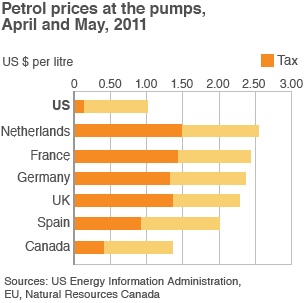
If we had higher gasoline taxes in this country offset by, say, lower retail sales taxes then on average people would have the same amount of money in their pockets. But we'd have somewhat less driving, and the driving would be done in somewhat lighter, more fuel efficient vehicles. The result is that the overall economy would be much less vulnerable to sudden shocks in the price of oil.
If you think about, say, the Netherlands they clearly have no ability to significantly influence geopolitical events in the Middle East or the extent of Chinese economic growth. Thus, it's very smart of them to have tax policy that's designed to leave them less vulnerable to these kind of events outside of their control. But if you look at the USA, it turns out that for all our military might we can't control these things either. But thanks to our bad public policy, we're extremely vulnerable to these shocks and thus have to observe the spectacle of politicians blaming each other for high gas prices even though they have very little ability to impact this on the short-term and cheap gasoline is undesirable in the long-term.


Pop Cultural Education Reform-Watch
By Alyssa Rosenberg
Given the buzz around, if not necessarily box-office success of, documentaries like Waiting for Superman and Race to Nowhere, it was probably inevitable that education would bubble up to the top of the List of Issues Hollywood Makes Things About. Between the new Ed Burns show about a public school starring Amber Tamblyn, the news that Maggie Gyllenhaal and Viola Davis are starring in a new movie where they play mothers who "join forces to transform an inner-city public school," and Fox's pickup of Zooey Deschanel's young-teacher-and-her-roommates comedy, teachers are claiming some of the space traditionally dominated by doctors and cops.
I don't really expect Deschanel's show to spend much time in the classroom or thinking about the political forces shaping what Deschanel does there. But both Burns' show and Gyllenhaal and Davis' movie are explicitly about how to make schools better. The key question for both projects will be what they identify as the problems with American education, and how they define the scope of reform.
Given Burns' track record on The Wire, and the focus on parents in the movie, I doubt either the show or the movie will focus on a model where all you need is a single charismatic teacher to turn a classroom around. But that leaves a lot of open territory. Will Davis and Gyllenhaal's characters fight for smaller class sizes? Get frustrated and found a charter school? Will Tamblyn's character come into her school as a Teach for America recruit? Trying to save her job in the face of Last In First Out-governed layoffs? Burns has a fairly well-developed perspective on education, but it'll be interesting to see how being on Fox rather than HBO influences how he conveys it. The bigger test might be with Gyllenhaal and Davis's project: whatever the script identifies as the problems and solutions in public education will say something about where the studio thinks the American public stands on reform.


Does Michael Gerson Think Alcohol Should Be Banned? Does He Know That Penguins Can Swim?

(cc photo by jrschau)
I suppose you could talk me out of this view, but it seems to me that the costs of full heroin legalization would far exceed the benefits. There's a lot wrong with America's current drug policies, but it's also good that we don't have heroin ads on Saturday morning cartoons, there's no Heroin Lobby on the Hill, and you can't buy heroin at the 7-11. That all seems pretty clear cut to me. But Michael Gerson seems to want to complicate it as a religious (yet ecumenical) concern that appears to imply that beer should also be illegal:
The conservative alternative to libertarianism is necessarily more complex. It is the teaching of classical political philosophy and the Jewish and Christian traditions that true liberty must be appropriate to human nature. The freedom to enslave oneself with drugs is the freedom of the fish to live on land or the freedom of birds to inhabit the ocean — which is to say, it is not freedom at all. Responsible, self-governing citizens do not grow wild like blackberries. They are cultivated in institutions — families, religious communities and decent, orderly neighborhoods. And government has a limited but important role in reinforcing social norms and expectations — including laws against drugs and against the exploitation of men and women in the sex trade.
It was just 12 years ago — though it seems like a political lifetime — that a Republican presidential candidate visited a rural drug treatment center outside Des Moines. Moved by the stories of recovering young addicts, Texas Gov. George W. Bush talked of his own struggles with alcohol. "I'm on a walk. And it's a never-ending walk as far as I'm concerned. . . . I want you to know that your life's walk is shared by a lot of other people, even some who wear suits."
Is the freedom to drink wine like the freedom of fish to live on the land? It seems to me that a few Protestant sects think it is, as does Islam and the Mormon Church. But Jews and Catholics think it's required to drink wine on some occasions. Religion, I think, is not a good guide to definitive policy conclusions and that's especially true when you try to make it an ecumenical theocracy. Here is a fish that lives on land and here is a bird that inhabits the ocean.


John Boehner Pushes Mythical "Crowding Out" Of Private Business Investment As Cause of Recession
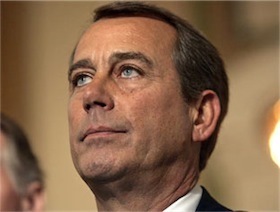
Writing yesterday about John Boehner speech on the debt ceiling I primarily focused on his negotiating posture, but Ruth Marcus is correct to say that his broader theory of the economy also needs scrutiny:
Reporters naturally tend to ignore this boilerplate. Journalistically, that makes sense. Boehner's economic comments were nothing particularly new. Indeed, they reflect what has become the mainstream thinking of the Republican Party. But that's exactly the point. We become so inured to hearing this thinking that we neglect to point out how wrong it is.
In particular, she notes Boehner's odd contention that "The massive borrowing and spending by the Treasury Department crowded out private investment by American businesses of all sizes."
As it happens, James Rowley and Mike Dorning have a good piece out on this for Bloomberg in which they don't that he "built his case on several assertions that are contradicted by market indicators and government reports".
Specifically:
"Look at interest rates. Look at capital spending," said Nariman Behravesh, chief economist of IHS Inc., a research firm based in Englewood, Colorado. "It's very hard to come to a conclusion that there's any kind of crowding out."
The cost of borrowing is low by historical standards. Yields on 10-year Treasury notes were 3.21 percent and yields on 2-year Treasury notes were 0.59 percent at 5 p.m. in New York yesterday, according to Bloomberg Data. Average spreads on investment-grade corporate bonds have narrowed from 1.64 a year ago to 1.39 on May 9, according to Barclays Capital.
The TED spread, the difference between what banks and the U.S. government pay to borrow for three months, fell 2.2 basis points since May 9, the biggest drop since April 5. A narrowing spread means banks are more willing to lend. The 23.87-point spread is just below the two-year average.
Also just look at investment. This chart separates out residential from non-residential investment:
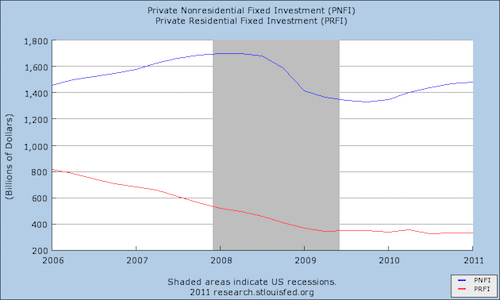
Did Barack Obama cause a decline in the housing market that launched several years before his inauguration? Is Boehner going to give him credit for reversing the decline in non-residential investment that commenced before he took office?


Revenge Killings In Benghazi
It seems to me that NATO's glorious new war in Libya hasn't been going nearly as well as its boosters hoped. Conversely, I'll say that it's gone a lot less badly than I feared, at least in the sense that we (so far) have managed to avoid getting caught up in the perverse logic of ever-escalating commitment. But whatever one makes of that, I hope people will pay attention to stories like this one from Kareem Fahim reporting from Benghazi on some nasty happenings behind rebel lines:
The men, Nasser al-Sirmany and Hussein Ghaith, had both worked as interrogators for Col. Muammar el-Qaddafi's internal security services, known for their brutality against domestic dissidents. The killings, still unsolved, appeared to be rooted in revenge, the families said, and have raised the specter of a death squad stalking former Qaddafi officials in Benghazi, the opposition stronghold.
The killings have unsettled an already paranoid city, where rebel authorities have spent weeks trying to round up people suspected of being Qaddafi loyalists — members of a fifth column who they say are trying to overthrow the rebels. If the violence continues, it will pose a stern challenge to a movement trying to present a vision of a new country committed to the rule of law, while potentially undermining hopes for a peaceful transition if Colonel Qaddafi surrenders power.
The sad reality is that the existence of a bona fide bad guy doesn't magically call a team of equal and opposite good guys into existence. On the contrary, once a political conflict becomes a contest of violence versus violence you're all but destined to be looking at a nasty situation. Inserting ourselves into these kind of conflicts just isn't the most promising outlet for humanitarian impulses.


Health Care Is Expensive Because America Pays High Prices For Health Care Services

Ezra Klein posted a super-long chart making this point yesterday, but it really can't be said often enough. The overwhelming reason that health care is so expensive in the United States is that Americans pay high prices for health care services.
That sounds banal or even obvious, but it's not banal and it keeps getting overlooked. But as an example, Medicare has lower reimbursement rates than do private insurance plans. Any given insurance plan would obviously be glad to reduce its reimbursement rates, but it can't because providers would stop seeing the plan's patients if they cut down to Medicare levels. But private insurance plans invariably benefit from federal tax subsidies. Congress could pass a law saying that insurers who pay higher than Medicare's rates are ineligible for the subsidy. Payments would tumble and competition would reduce premiums. Alternatively, we could rescind the tax subsidy for private health insurance, institute a Value Added Tax, and create a Universal Medicare system. Either way, some providers would drop out but the vast majority would simply be forced to swallow lower payments.
Even more clearly, we could impose price controls on pharmaceuticals or reduce patent lengths.
Now the concern with any of these ideas would naturally—and to some extent rightly—be that if you impose tight price controls, quality and availability will suffer. Lower pharma profits means less pharma R&D. Stingier hospital payments means fewer beds. Lower pay for doctors might mean lower quality doctors. Those aren't crazy worries. Arguably the rest of the world gets by free-riding on American generosity. We provide the windfall profits that drive innovation and they offer payments much closer to marginal costs and save money. But whatever you make of this it's not like there's some magical pixie dust in the air in foreign countries, they're spending less because they're spending less.


Cato's Daniel Mitchell Calls For US To Imitate Mass Unemployment Policies of The Baltics
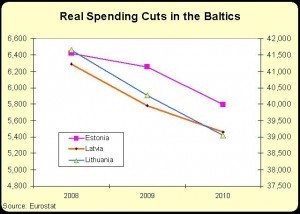
The Cato Institute's Daniel Mitchell says the United States ought to consider taking a page out of the Baltic playbook:
Too bad American policymakers can't copy the Baltic nations of Estonia, Latvia, and Lithuania. Like the United States, these nations got in fiscal trouble, thanks to the combination of excessive spending and an economic downturn triggered by falling real estate prices.
But unlike the United States, these nations didn't follow the Keynesian policy of more deficit spending. Lawmakers in the Baltic nations recognized, to borrow the words of Dan Hannan, that "you cannot spend your way out of recession or borrow your way out of debt."
So they reduced spending. Not in the Washington sense, where politicians get to increase spending and call it a cut because outlays didn't rise even faster. The Baltic nations imposed real cuts. And not just for one year, but in both 2009 and 2010. Here's the data from the European Union for the Baltic nations. [at right]
So how's this working? Well, terribly! Estonia has a 14.3 percent unemployment rate and it's doing way better than the other two:
Also note that back in the spring of 2007, Mitchell was hailing the Baltics as a model of economic success. Then came some of the most severe crashes in Europe.


May 10, 2011
Endgame
How could they even care?
— I don't really know what Rich Kahlenberg thinks he and I disagree about.
— America has the highest gini coefficient in the OECD.
— What Esther Duflo reads.
— The plan to .
— Are white collar workers wasting more time than ever before?
Micachu and the Shapes, "Golden Phone".


Matthew Yglesias's Blog
- Matthew Yglesias's profile
- 72 followers



